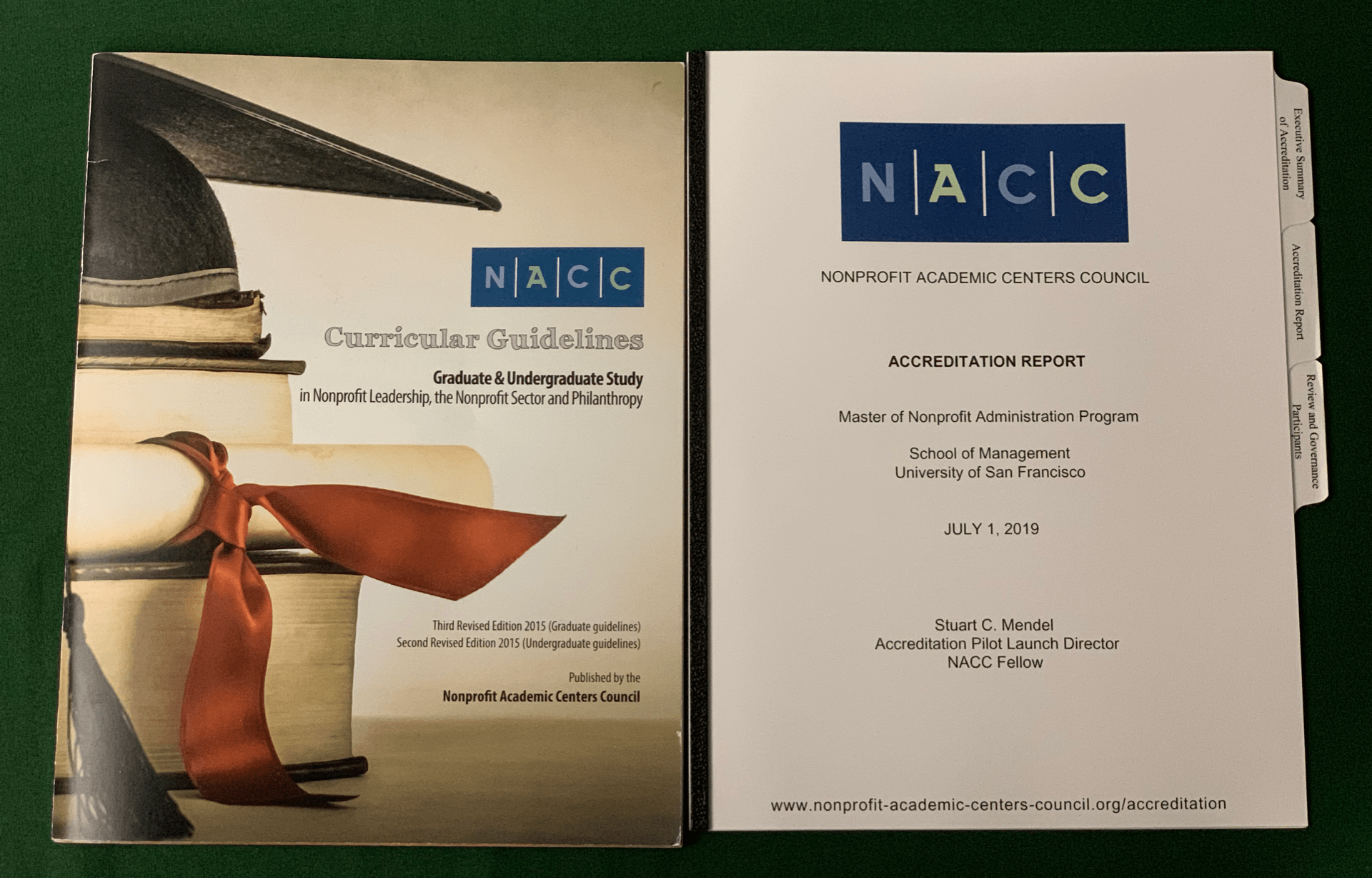
The Nonprofit Academic Centers Council (NACC, founded in 1991), the leading organization promoting and regulating nonprofit management education, achieved an important step in 2019. It launched the first accreditation for nonprofit specific educational programming. The Master of Nonprofit Administration (MNA) program at University of San Francisco (USF) was one of the first programs to be officially accredited on July 1, 2019. While this accreditation process may not make headlines among nonprofit professionals, organizations, and even nonprofit students, it is a giant leap towards the professionalization of the sector. Older and more established accrediting processes specific to business administration (MBAs) such as The Association to Advance Collegiate Schools of Business (AACSB International, founded in 1916), and those specific to public administration (MPAs/MPPs) such as The Network of Schools of Public Policy, Affairs, and Administration (NASPAA, founded in 1970) have opened their processes to nonprofit management or nongovernmental leadership programs. However, the nonprofit and social sector is something that requires specific education to guarantee the managerial competencies and leadership capacities for more impactful and effective not-for profit businesses and non-government administered organizations.
As a student of history, I was reading about the professionalization of careers. Interestingly, there was a time in which today’s highly regulated and exclusive professions such as medical doctors and surgeons were simply “glorified barbers” with sharp tools for limb cutting and “bloodletting-cures.” To this day, the typical barber pole its red-white and later red-white-blue versions that are ubiquitous symbols of the barbershop emerged in the middle ages to signify the “barber–surgeons” practices. It took centuries and radical cultural changes to legitimize and regulate the medical professions through a rigorous and accredited education. Sometimes, it seems that the nonprofit sector is still at this rudimentary stage. Successful business leaders claim to know what our communities need and, leveraged by their financial donations, they enter the social /nonprofit sector prescribing cures based on their concerns for businesses and efficiency. Yet, nonprofit organizations in their multifaceted identities of charity-tax exempt organizations, nongovernmental-international development organizations, community based and faith-based organizations, social movements and social enterprises are more complex than what they first appear. Nonprofits require more than business acumen. They involve more than good intentions of volunteers. They need competent and dedicated professionals equipped with managerial skills and good values of compassion and humanity. They need leaders and managers capable of combining business sustainability with human rights-based policies. If we are serious about the well-being of our communities, we should also be serious and respectful of the competencies necessary for nonprofit administration and social sector management.
The NACC accreditation process assesses these complexities specific to nonprofit management education. Its prioritization for managerial competencies combined with social-humanitarian values reflect the root of Jesuit college education forged 500 years ago. The MNA-USF (established in 1983) has been a pioneer in advancing the specifics of nonprofit administration, management and leadership careers combining the necessary organizational competencies with the essential community equity, human dignity, and inclusive diversity mindsets. While other MBA-like and MPA-like programs increasingly include these integrated characteristics (see PRME for example), the nonprofit specific degrees will continue to sharpen the appropriate preparation for efficient and effective careers for third-sector, philanthropy, CSR/Sustainability and for other community-driven social economy solutions. USF has been a leading example of this by establishing the first nonprofit administration MNA degree. This degree corresponds to the older MBA and MPA degrees. These degrees did not generate a unified voice with other academic institutions who preferred to develop similar but differently named degrees emphasizing management (MNM), organizations (MNO) or leadership (MNL). Indeed, the diversity of the nonprofit / social sector approach is its strength. But these differently named degrees cause confusion and slow down the professionalization process for nonprofit managers and third sector professionals who place nonprofit impact, social transformation and community benefits first.
Therefore, we congratulate NACC for leading this important accreditation process. It is a small step but also a giant leap in the professionalization of the sector. We also congratulate the faculty, administration, alumni, advisors of the MNA program at University of San Francisco’s School of Management who scored 15 out of the 16 maximum accreditation points following the NACC 2015 curricula guidelines. In addition to this accreditation of quality, the program was recognized for its integration of international perspectives, experiential learning, and social impact data analysis. We are proud of our students and graduates who lead the way for a better, more inclusive, more equitable, and more sustainable future. We are part of history! It is time to celebrate! Keep up the good work!



